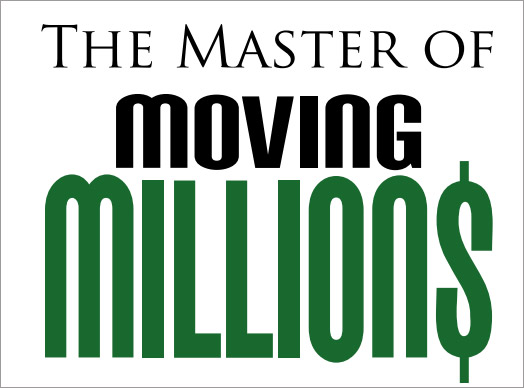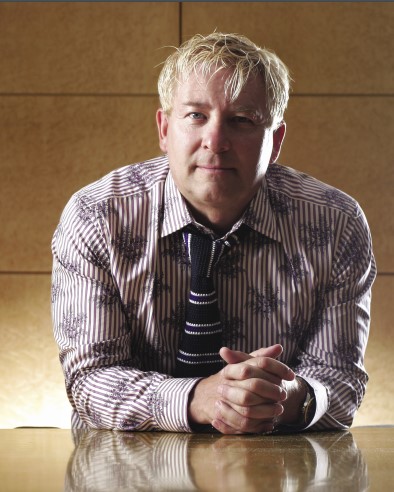
Vex Magazine, The Master of Moving Millions
CALGARY BUSINESS MOGUL KEITH TURNER
WHEN FIRST TOLD I would meet and interview Keith Turner, President and CEO of MeridianMerchant Capital Canada Ltd., I wondered how to make the man sound interesting and captivating to a reading audience that predominantly grabs Vex Magazine off the shelf, flips open the centerfold and admires the erotic pose of the latest Cowtown beauty. I don’t blame you. After all, Turner himself has no hesitations about stating, “Lots of people find the financial industry a big mystery or intensely boring.” Great, even he knows that most readers probably won’t make it this far. Try to stick with me on this. As a former Financial Services Manager at Bank of Montreal, I couldn’t agree with him more. There isn’t a faster way to end a conversation at a party when asked, “So what do you do for a living?” And you respond, “I sell mortgages, lines of credit and insurance.” Screech, crash and burn. So in order to make a dull story come to life you have to add in a few exciting ingredients like a cup of hockey, a spoonful of Hollywood producer and pinch of sexy.
Basically what Meridian does is known as ‘merchant banking’, which, in the financial world, is tantalizing stuff. When a company is looking for financing and can’t go through a bank for whatever reason, or would rather deal with the private sector, Turner and his staff “put the right people together with the right money at the right time”. Merchant banking has been around for hundreds of years in Europe, has spread to other parts of the world, but is relatively brand new in Western Canada.
Turner’s background consists of 30 years of mostly merchant banking in the UK, New York, Vancouver and now Calgary. He is a self-professed right-brained, fun-chasing dude with a natty, well-conversed wardrobe, who is leftbrain-trained in banking. He knows the banking and financing system like a goalie knows his opposition’s weaknesses, but can’t wait to write a song and jam with his son. He is as atypical as they come.
Back in the day when farmers wanted to borrow money to take advantage of a novel idea they might have about how to get rid of their grain in the market, for example, the banks may well have refused financing and a great opportunity could slide. What merchants would do is lend money to their customers in order to give them a chance to bring their ideas to fruition. The merchant, in turn, becomes a lender much like a bank, who has a keen interest in the success of the farmer because inherently both parties prosper. In a normal lending Interview transaction between an institution and borrower, the lender does not offer support for the borrower and the only interest the lender has is the interest being paid.
This philosophy is what makes Turner and his staff at Meridian unique. “What makes us different,” explains Turner, “is not just that we are finding bank financing, we are finding equity for business owners. We are finding what is known as Mezny financing, which is a financial instrument that allows people to buy a business without giving up a lot of the equity to the lender. It’s a hybrid between debt and equity. What we do is brains trust, plus money. My job is not just to get you the money, but also to get the right money and to position your business so that it will be successful with that money. So, yeah, a lot of the time we don’t leave. When a company has bought another company, we help people through acquisitions. We help identify them. We help research them. We send out teams to do the financial analysis, raise the money for them, and then we close them. Once it’s closed is when the work starts. Just because a guy owns a business that does $10M in sales and buys a business that does $10M in sales doesn’t meant that he or his team is equipped to handle a $20M business. There is a scaling issue. Who is going to help him with that? So if we give him the money and leave, are we doing him any favours? We should give him the money and stick around and make sure we are there to help him properly deal with the money and to deal with the scaling issue. So for most of our clients, that is a big issue, we stick around. We like sticking around.”
One of Meridian’s clients is the new ownership team of the Tampa Bay Lightning. When given the assignment to do a story on Turner, the man who moves millions, all I knew was that Meridian was potentially involved with the sale of the team. As a sports nut and an exfinancial guru, I thought the challenge of this story would intrigue me, even though it might be monotonous and bore the hell out of you. Plus, mentioning the recent sale of the Lightning may be a sore spot for some Calgarians, given the fact four short years ago they stole Stanley’s Cup from Iggy and company. But let’s try to put that aside for a moment and look at it like a hockey story, where the bad guy gets saved by the good guy and in the end it makes for a better sport.
Meridian deals with mega-sized, private com-panies that pull in anywhere from $5M to $100M annually, but places no restrictions in which sector it will work. In this particular case, Tampa Bay was looking for new ownership of their hockey team, and as happens daily in business, it’s who you know that gets you the deal. Randy Lennon, Managing Director, and Vice-President of Business Development and Public Relations for Meridian, was the key player behind the Tampa Bay deal. He knewvestment-banking firm, as it could open the door for many more sports and entertainment deals. The fact that a Calgary business is in-volved at all is huge, but according to Turner, the idea behind Meridian was to become a major player in the international financial sec-tor. In three short years, Meridian has done just that. And because of their success, Turner is proud to accept the nomination for Ernst and Young’s Entrepreneur of the Year, Prairie Region. I suppose this boring little story about a Cal-gary-based company, run by a native of Scotland, living in Vancouver has dire conse-quences. The Lightning have been recharged after a disastrous campaign last year. They have new ownership, a multi-year, multi-mil-lion dollar deal with Lecavalier, new hope, and connections in Hollywood. Can you see it now? Tampa and Calgary vying for the right to raise the Cup, again. This time, the Lightning will have behind them the producer of some of the scariest films ever created. Movies that in-stilled fear like no other before it. The Flames, however, will have Bertuzzi.50 JULY/AUGUST 2008 www.vexmagazine.comInterviewthe right people at the right time and basically was introduced to Oren Koules, a Hollywood producer best known for his work with the Saw movies. While sitting in Meridian’s luxu-rious boardroom, Turner was explaining that the negotiations for the sale of a sports fran-chise is definitely a glamorous part of the job but is not indicative of their regular business transactions. I asked how things were going with the Lightning sale and Turner explained, “That will be a matter of fact or fiction before you finish writing this up.
The NHL is rubber-stamping or ratifying the change of ownership today and the financial deal will close on the 30th of June. Our firm is involved in that.” No later than two minutes had past, when Len-non walked in, apologized for interrupting, and slid a piece of paper across the massive table, which rested in front of Turner. Humble and confident, Turner almost whispered, “Hmm. Well, there you go”, and slid the paper in front of me. Like the plot point of a good movie, I read the TSN news release that was still wet from the printer, and it said, ‘NHL APPROVES SALE OF LIGHTNING’. “I find putting a deal together somewhat satisfying and sexy,” he says. “Last year we did $75-$100M in busi-ness and that is money that gets put into the Calgary community. So that is kind of a sexy thing too, right?”

Like any other business, they get bought and sold everyday. The previous owner of the Lightning, the same man who owned the team when they defeated the Flames, was looking to sell. Oren Koules, who is known through-out the Los Angeles men’s recreation hockey league as ‘the guy who came to Hollywood to make films and play hockey’, finally got his opportunity to not only play hockey but make the move and buy a successful NHL hockey franchise after the hugely successful Saw movies nestled six-figure pay cheque’s into his wallet. Koules was looking for other inves-tors, as he had already committed millions of his own money to the project. With Meridian’s help they were able to identify a possible partner, who could not only supply equity, but also sponsorships. A potential partner, a very large presence in the Tampa community, was unknown to Koules. Meridian basically made this alliance happen and will stay on as advi-sors as everyone involved has an interest in making the new ownership work. As Turner stresses more than once, they get the right people hooked up with the right money. It was important to all parties that the equity partner had to come from the Tampa area because it showed an interest from the community. This important element was lacking, as the previ-ous owner was known by name to the fans of Tampa but not by face. He was not from around those parts. In fact, the night they won the Stanley Cup, he vanished shortly after the game in his private jet.
As a Flames fan, you probably could care less, but as a hockey fan and a believer that the league has to stay strong, see it for what it is, that this is a great move by Tampa as well as Meridian. And if you were wondering why the Lightning didn’t pursue financing a little closer to home, well they did. A very large financial institution, however, left them high and dry with commitments left unattended because of the extremely weak market in the US at the moment.
It’s no accident that Meridian’s headquarters is in Calgary. Turner has done deals all over the world and currently lives in Vancouver but says, “Calgary is the other financial center in Canada. Toronto is full of what I call the New York wannabes. This is the other place where deals and business happens. It’s a legacy of the oil and gas industry, with a somewhat cowboy mentality. In Vancouver, people aren’t there to work. It’s a vice-president town. Mon-treal is a fabulous city with a fair amount of business, but from an English perspective, a difficult town to deal with. Winnipeg is small and specialized, while Edmonton has a lot of prospects and has some real opportunity.”

This is exciting news for a Calgary-based in vestment-banking firm, as it could open the door for many more sports and entertainment deals. The fact that a Calgary business is in-volved at all is huge, but according to Turner, the idea behind Meridian was to become a major player in the international financial sec-tor. In three short years, Meridian has done just that. And because of their success, Turner is proud to accept the nomination for Ernst and Young’s Entrepreneur of the Year, Prairie Region.
I suppose this boring little story about a Cal-gary-based company, run by a native of Scotland, living in Vancouver has dire conse-quences. The Lightning have been recharged after a disastrous campaign last year. They have new ownership, a multi-year, multi-mil-lion dollar deal with Lecavalier, new hope, and connections in Hollywood. Can you see it now? Tampa and Calgary vying for the right to raise the Cup, again. This time, the Lightning will have behind them the producer of some of the scariest films ever created. Movies that in-stilled fear like no other before it. The Flames, however, will have Bertuzzi.



